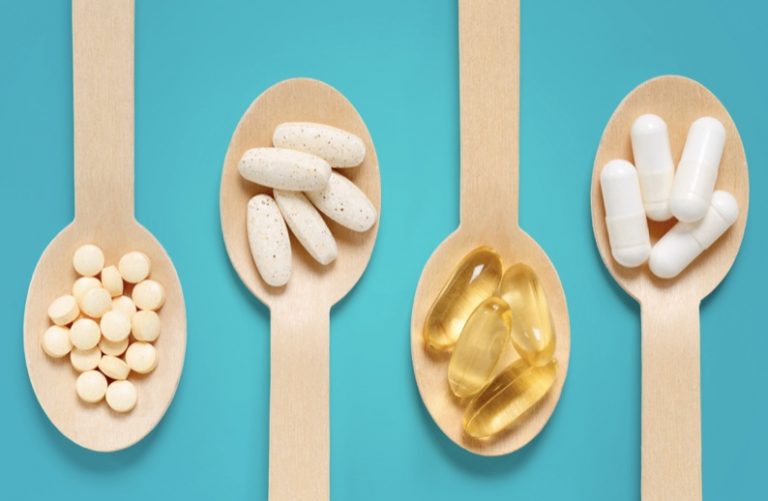Supplements are nutrients and enzymes that support your overall health. Certain supplements are effective in boosting energy and can ensure you are in the best health for reproduction.
You can find fertility supplements that support your egg health and fertility and may help increase your chances of getting pregnant after 40.
Story Stages
What Are Supplements?
Dietary supplements come in many forms besides vitamins and minerals. You can find herbs and botanicals or amino acids and enzymes to take as a dietary supplement. These supplements are available in pill, powder, gummies or liquid form to make it convenient to consume them. Examples of supplements include pills and gummies like daily multivitamins and probiotics, powders like collagen and liquid supplements like fish oil. Every supplement is labeled with its active ingredients, inactive filler ingredients and their amounts.
Effectiveness of Supplements
Research from the National Institutes of Health shows that many dietary supplements improve your health. Vitamin D and calcium support bone health and growth. Taking B12 helps keep your nerve cells healthy. Supplements like folic acid effectively reduce birth defects and taking fish oil supplements supports fetal brain and retinal development.
Supplement Risks
You should always be cautious before starting a new supplement. Everyone reacts to medications and supplements differently. You could experience side effects if your supplement dosage is too strong for you. Make sure to check the filler ingredients to prevent a reaction in case an allergen is present. Supplements can interact with other medications you take and increase the risk of health problems if you have certain medical conditions. St. John’s Wort is a popular herb that can make prescription drugs like birth control and antidepressants less effective. People on blood thinners need to avoid Vitamin K supplements, as it decreases the effectiveness of their medications.
Talk with your doctor before starting any new supplement regime. They will help you determine what supplements would benefit you and the dosage you should look for. Your doctor can check for drug interactions and make sure they are safe for you to take.
For personalized supplement guidance and to explore a curated selection of natural products, visit Winona, where your well-being is our priority.

Are Supplements Safe for Pregnancy?
There are plenty of supplements that are safe to take before and during your pregnancy. It’s recommended you take at least 400 mg of folic acid daily for at least one month before you plan on becoming pregnant and throughout your pregnancy. Folic acid is a B vitamin that prevents birth defects in the spine and brain and is found in many prenatal vitamins. Iron supplements, vitamin D, calcium and omega-3 fatty acid DHA are also recommended to take during pregnancy.
Supplements to Consider
If you are dealing with infertility, undergoing IVF or egg freezing treatments or getting pregnant after 35, consider adding a supplement to improve your chances of a healthy pregnancy. Supplements like DHEA, CoQ10/Ubiquinol and prenatal vitamins support your overall reproductive and cellular health.

DHEA
Your body naturally produces the DHEA hormone in your adrenal glands. DHEA helps your body produce other hormones like estrogen. Typically, DHEA levels peak in early adulthood before falling as you age. Science shows that taking a DHEA supplement can improve ovarian health and may improve egg quality. If you suffer from premature ovarian aging or poor ovarian reserve, you may benefit from taking a DHEA supplement.
These supplements come in pill form with a recommended dosage of one 25mg pill three times daily for at least two months prior to egg retrieval or planned pregnancy. The effectiveness of DHEA can be monitored by your doctor through testing your FSH levels. Side effects from DHEA supplements are rare, though you may experience acne or hair loss. Many patients find they have better energy levels and an increased sex drive while taking DHEA. Patients with a history of hormonal cancer, including breast and ovarian cancer, should not take a DHEA supplement. Women with other hormonal conditions like endometriosis and PCOS are also advised to avoid DHEA.
CoQ10/Ubiquinol
Coenzyme Q10, also known as ubiquinol, is a naturally occurring molecule present in your body’s cells. It helps your cells generate energy and is crucial to maintain the health and operation of your tissues and organs. CoQ10 levels decline as we age, and it’s difficult to get the amount we need from diet alone.
Studies show taking CoQ10 may reduce the risk of pre-eclampsia and premature labor due to high inflammatory levels. Research also shows taking CoQ10 before you get pregnant helps your ovarian health and improves the quality of your eggs. Dosing for CoQ10 supplements ranges from a daily dose of 100 mg to 300 mg pills to be taken with a meal or food. Check with your doctor before taking this supplement if you suffer from medical conditions or take prescription medications.
Prenatal Supplements
You need more vitamins and minerals to support your health and your baby’s development during your pregnancy. This is why if you are pregnant or trying to conceive, doctors recommend taking a prenatal vitamin. Prenatal vitamins contain supplements essential for bone growth, brain development and reproductive health during pregnancy. Common vitamins and minerals in prenatal vitamins include:
- Vitamin D and calcium for bone and tooth growth
- Iron for placental health and getting oxygen to the fetus
- B vitamins like biotin, B6 and B12
- It may also contain vitamins A, C and E, along with minerals like zinc, iodine and magnesium
If you are trying to get pregnant after 35, consider adding a preconception supplement to support your ovarian and egg health. These supplements contain the same vitamins and minerals to support your health and prepare your body for pregnancy as prenatal vitamins.
Use High-Quality Supplements
Not all supplements are created equal. Ensure the supplements you take are backed by research and are proven to be effective and safe for use in pregnant women and those trying to conceive. Look for companies using the latest technology to produce more effective supplements. Only buy accessories from companies that independently test their products ( example: https://flawlesswellness.co.uk/ ). This means a third party has verified the potency and quality of the supplement being sold.
If you are concerned about your egg health or getting pregnant over 40, consider adding fertility supplements to your regimen. Quality fertility supplements like DHEA, CoQ10 and prenatal vitamins help support your reproductive health and increase your chances of a healthy pregnancy. Always consult with your doctor before starting any new supplement.
